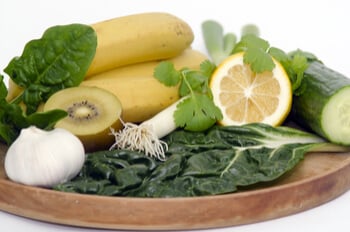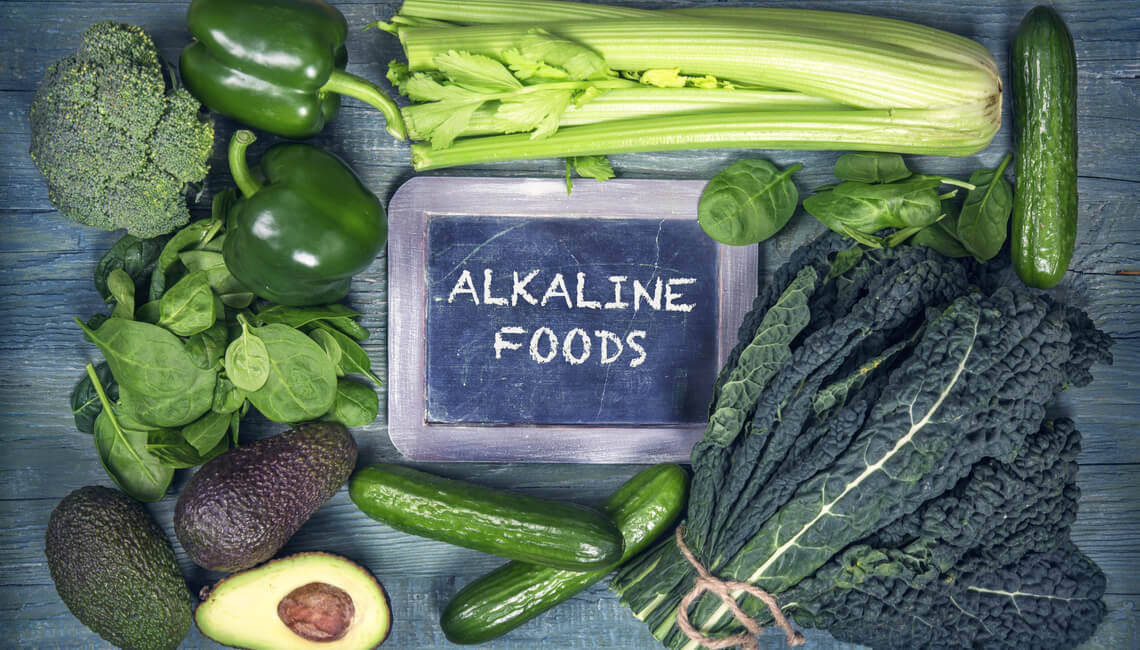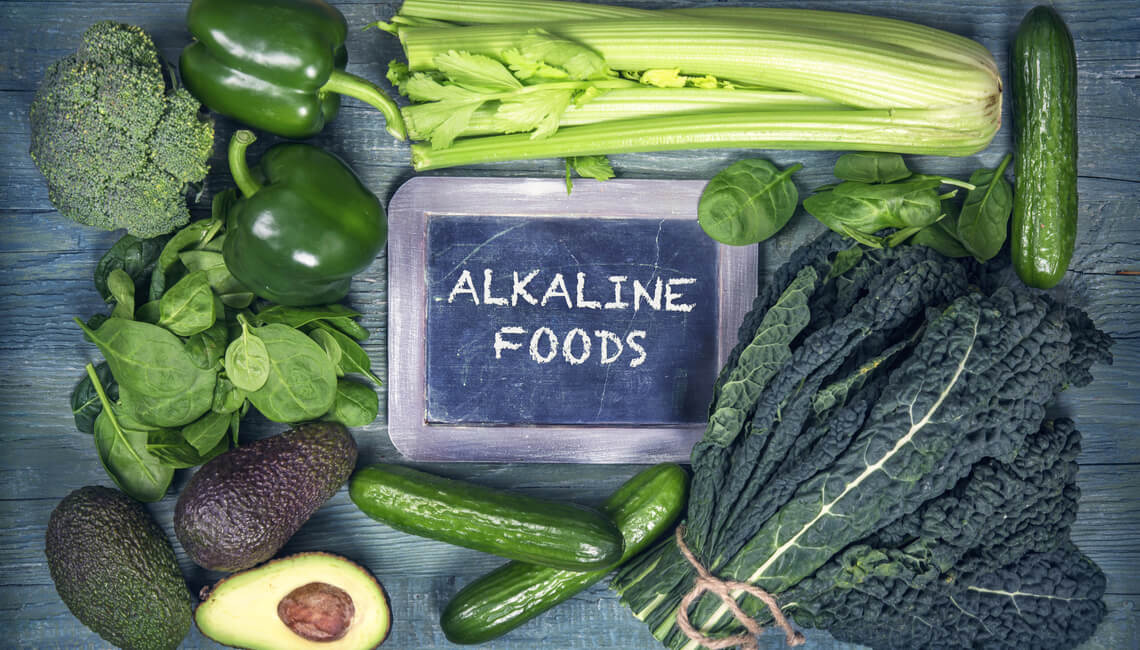Balance Beaming
The Alkaline Diet promises to bring your body and fitness goals back to center. Could it really be the key?
BY Hendrik Coetzee
It’s been another long day at the office. You barely have enough time to break a sweat at the gym before heading home for a glass of Barolo and a healthy portion of protein—some delicacy sanctioned by Atkins, the Zone, or the South Beach Diet. While you feel leaner, you’ve begun to experience occasional bouts of acid reflux, and feel fatigued on a mental and physical level. You even fear that perhaps you’re developing an allergy to certain foods.
Atkins, Zone, and the South Beach Diet focus on controlling insulin levels—advocating low-carbohydrate, high-protein meals. The key to undoing your body’s newfound distress, however, may be found in a buzz-worthy new protocol called the alkaline diet. This food philosophy focuses on the maintenance of your body’s pH level around the optimum level of 7.4. This is achieved by ingesting more fruits and vegetables—which are alkaline in nature—and staying away from dairy, grains, and proteins, which are acidic.
All living organisms and cells on the planet need to maintain a certain pH level to survive. According to an alkaline diet study published by the Journal of Environmental and Public Health, the ratio of potassiumto- sodium in our diets has reversed since the preagriculture period.
The most dramatic shift has taken place since the dawn of the Industrial Revolution— this ratio has declined from 10 to 0.3. A modern, generally accepted diet is low in magnesium, potassium, and fiber while high in saturated fat, sugars, sodium, and chloride. The alkaline diet reverses this imbalance, reintroducing more potassium and other beneficial minerals into the body.
Dr. Susan Brown of the Better Bones Clinic in East Syracuse, New York says that the body can suffer from chronic, lowgrade metabolic acidosis. “This is a low level of acid build-up in the body and occurs if the diet is imbalanced with too many acidic producing foods being consumed,” Dr. Brown says. Protein, a regular staple of the American diet, contains sulfur, comprised of amino acids. As protein metabolizes in the body, acid is generated. The body has a very narrow pH range in which it needs to stay in order to survive. “Even if you are slightly acidic, you can alter enzymes and cell functions,” says Dr. Brown. “This stimulates the breakdown of bone.”


The cure: the alkaline diet, which slows down muscle wasting and reduces lactic acid in strenuous exercise, which in turn allows athletes to perform better. So, should we just stop eating meat and other acidproducing food altogether? Dr. Brown notes that if you have a well-balanced diet and are in good health then your diet should be 60 percent alkaline.
However, if you have health issues, it is preferable that you increase that number to 80 percent. Dr. Brown’s clinic has developed a pH test kit to measure the acidity of urine, offering a rough idea of a person’s “acidic load” and offering a determination whether they ought to eat more or less acidic producing foods.
SANJAY MODY of San Francisco offers another opinion. Mody became aware of the alkaline diet a few years ago and ran a clinical trial on himself. Having consumed a high quantity of red meat and alcohol, he found that it took three days for his urine to return to a normal state. “I had a hoarse voice and a cough whenever I consumed anything acidic or ate late at night,” he says.
He then went on the alkaline diet, and found that he had less acid reflux. He recommends that people try the diet, as everyone has a “normal variation” on how they respond to what they consume. This is reflected by factors like genetics, lifestyle, and environment. “When they mix together, you get an overlay in the Venn diagram,” he says, referring to the overlapping tri-circle graph. “The center is how that diet is going to affect each person.”
Dr. Mody notes that in the United States, acid reflux is one of the largest complaints heard by doctors. Such is the side effect of a high-paced lifestyle, long work hours, and stress that accompanies these factors. A diet rich in red meat and of wine adds more acid to the mix. While he insists that he has seen no evidence that the alkaline diet affects bone loss, he points out that the diet will certainly benefit people who exercise frequently.
“The body builds up lactic acid when exercising strenuously and becomes more acidic,” he says. Randy Couture, a famous Ultimate Fighting Championship fighter, is a proponent of the alkaline diet, declaring that it has allowed him to maintain strength, reduce weight, and recover faster from workouts and circuit training. Dr. Mody notes that muscles ache less when one eats in this manner, as lactic acid is reduced and muscles are able to recover faster.
He goes on to say that by switching to the alkaline diet the body has less work to do and the person ends up less tired and with less infection, allergies, or food intolerance. It also may help mental clarity, concentration, attention span, memory, and decision-making.
ALL THIS SAID, DR. TANIS FENTON—who has studied the alkaline diet in her work at the University of Calgary—believes that the protocol does not hold up to scrutiny. “The science doesn’t support the diet in a number of ways,” she says.
Dr. Fenton states that our blood pH does not change, as our kidneys and our lungs are working continuously to keep it at about 7.4—and that the kidneys do that by excreting hydrogen ions and also bicarbonate and salts while our lungs excrete carbon dioxide. She notes that when original studies were conducted, they found that there was increased calcium in urine output, suggesting that the body was drawing reserves from bone to compensate for the body’s acidity.
However, with a more detailed study, they looked at the calcium that was excreted in the stool as well as the urine. They found that there was a net balance, as calcium was getting absorbed in the gut. “There was more calcium in the urine, but when you look at the whole balance there wasn’t more calcium coming from the bones, because it balanced between the urine and the stool.”
She goes on to say that calcium is better absorbed from food in a more acidic producing diet, and that studies have shown that protein is good for bone health. As for muscle wasting, Dr. Fenton notes that there are not enough studies to make a conclusion and that we do need to consume sufficient protein to build muscle. As for lactic acid: “It’s a short-term phenomenon, and what people need to do is slow down a little a bit.
Within a few moments, it will clear.” Dr. Fenton states that she has seen no evidence that the Alkaline Diet improves anybody ailments, and that the only positive aspect of the diet is that it encourages people to eat more fruits and vegetables. The previously mentioned alkaline diet study makes the following assertion: “There is no substantial evidence that this improves bone health or protects from osteoporosis.”
However, it does find that having more fruits and vegetables would increase the potassium to sodium ratio and “may benefit bone health, reduce muscle wasting, as well as mitigate other chronic diseases such as hypertension and strokes.” Additionally, an alkaline diet “may improve many outcomes from cardiovascular health to memory and cognition.” There is a spectrum of medical opinions on the efficacy of the alkaline diet. However, the medical community tends to agree that it is beneficial to eat more fruits and vegetables—a common-sense suggestion since the dawn of time.
But it is important to note that we all have a “natural variation” given our genetics, lifestyle, and the ever-changing environment we live in, so some diets may work for some and some diets for others. Some individuals can perform perfectly fine on highprotein diets while others are finding that they function and feel better if they become vegetarian, vegan, or gluten-free. It may be worth trying out the alkaline diet if you have acid reflux, food allergies, or are just feeling mentally or physically tired after a long day of work.
Perhaps most advisable of all is to educate yourself on the variety of diets available, take an honest look at your own wellness goals, and strike a logical balance between the philosophies identified as beneficial by you and your medical professional. Balance is the operative word with the alkaline diet and health in general, is it not?
ALKALINE FOODS
BROCCOLI
PEPPERS
LETTUCE
SWEET POTATOES
APPLE
AVOCADO
LEMON (EXTREMELY ALKALINE)
TOMATO
ALMONDS
CHESTNUTS
CURRY
GINGER
PROBIOTIC
CULTURESAC
ACIDIC FOODS
CORN
LENTILS
OLIVES
WINTER SQUASH
BLUEBERRIES
CRANBERRIES
BREAD
PASTA
BLACK BEANS
BUTTER
PEANUTS
BACON
LOBSTER












